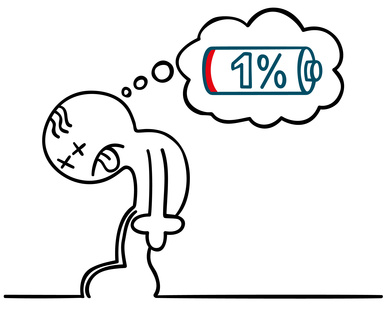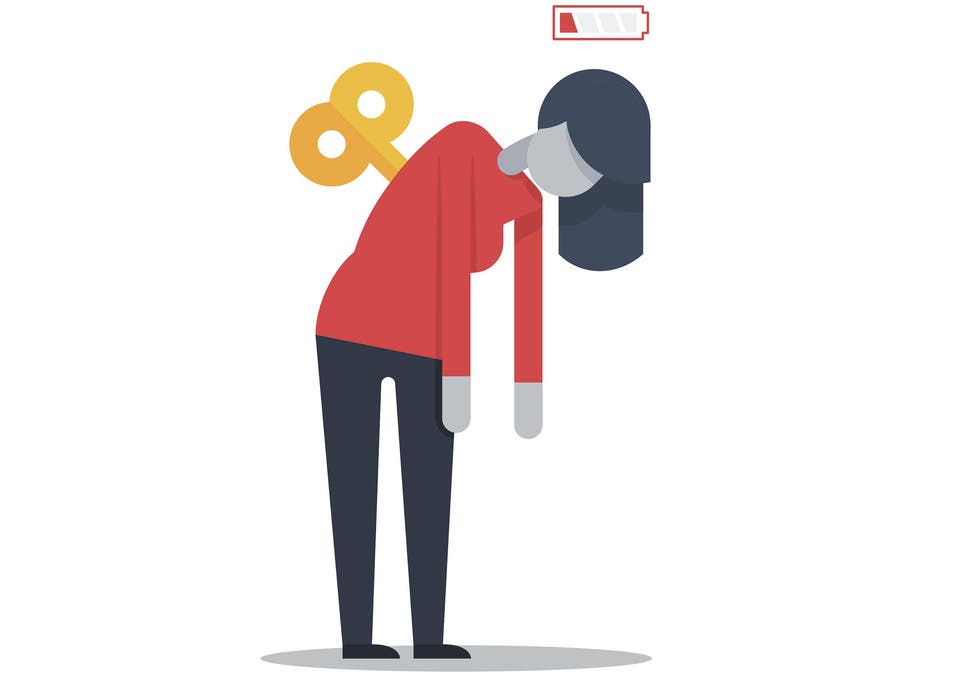Today’s article hosts the Chronic Fatigue Syndrome (CFS), a disorder presenting a huge and unnecessary fatigue for long periods. Chronic disease may operate even in “cumulative” way, resulting in a feeling of exhaustion, fatigue and unjustified stress on the body.
Symptoms – though obvious over a long period (this being the reason for talking about a chronic disease) – often tend to go unnoticed by the patient being rationalized and justified. Fatigues at work, intense stress, poor diet are some excuses often used to justify the unexplained fatigue felt and our inability to meet our daily obligations.
A more detailed look helps at understand this disorder better, while offers a chance on how to deal with it effectively.
Chronic Fatigue Syndrome: Definition
Chronic Fatigue Syndrome is a pathological condition (not psychological disorder as believed by many persons) manifesting itself with a feeling of intense physical fatigue.
The difference is that, no matter how much a person improves its sleep schedule, its diet and its life quality as well as its physical and mental rest, the feeling of fatigue persists with the same intensity.

In fact, in most cases patients experience a severe deterioration over time and failure to treat the disease.
(!!!): Unfortunately, many people suffer from this disease and – due to its ambiguous symptoms – do not realize it so to deal with it properly.
It is a kind of “mysterious” disease being manifested by physical exhaustion, often accompanied by pain, mild at certain times, or very intense & penetrating at others.
Permanent fatigue overwhelms the person to such degree… even not being able to concentrate lagging behind in its perceptual ability.
People generally healthy are not able to get out of bed in the morning, cannot concentrate and constantly feel exhausted like sick.
Who is the best expert to visit?
A physician?
A psychologist?
Or a neurologist?
People – due to ignorance – tend to ignore the “signs” given by their body, resulting to the fact that the disease becomes chronic, evolving in a constant way, with more pain, greater feeling of tiredness and an ever-increasing feeling of weakness & inability for daily activities.
How Stress affects Chronic Fatigue Syndrome?
As mentioned, Chronic Fatigue Syndrome (CFS) is a pathological and not a psychological condition.
However, how stress and systemic stress relate to a person’s life with this condition?
Usually – as experts explain – this disease occurs on a severe stressful situation.
The more demanding and responsible a person’s daily life is, the more likely to develop the Chronic Fatigue Syndrome.
However, it is not only the responsibility itself being the main cause of such a disease. Usually occurs in people with a specific psychological profile, people with high demands on themselves, difficult people accepting no failure, collapsing following any “defeat” and being psychologically lost.
Certainly, a problematic condition (underlining anemia or various infections) makes the situation even more difficult, increasing the risk of developing the syndrome dramatically.
TIP: This is the main reason while referring to it as a pathological condition – doctors usually recommend parallel psychological support of the person by specialists (psychologists, psychiatrists, psychotherapists or even neurologists).
The doctor is able to assess the patient’s condition and provide the most appropriate treatment / medicine (usually includes psychotherapy, exercise, proper nutrition and administration of anti-inflammatory / analgesic drugs).
The 2 “points of view” of the Disease

According to experts, Chronic Fatigue Syndrome classified into 2 main subcategories, being differentiated by their symptoms.
No.1 : The person usually has a persistent feeling of exhaustion & inability to concentrate, regardless of its sleep schedule. In this case, there may not even be any other physical reasoning / condition / disease justifying this intense fatigue a person feels on a daily basis.
In fact, this stress may not even be related to a psychological disorder (associated with a mental illness).
No. 2 : The person in this case usually shows some characteristic symptoms in combination with the feeling of fatigue, guiding the doctor to a diagnosis.
The patient – in most cases – shows 3 or more of the following characteristic symptoms:
- headache
- possible & persistent migraine
- muscle aches (myalgias)
- joint pain
- sore throat
- swelling of the lymph nodes
- constipation
- diarrhea
- dizziness
- vertigo
- photosensitivity
- sensitivity to loud sounds
- feeling strong pulses
- decreased blood pressure
- inability to concentrate
- memory problems
- reduced cognitive ability
- reduced perceptual ability
- sleep disorders
- slightly elevated temperature
- brain fog
- bloating
- ear pain
- alcohol intolerance
- balance problem
- allergic reactions to drugs / odors / foods
- chills
- night sweats
- stomach ache
- dry mouth
- dry eye
- chronic cough
- chest pain / heaviness
- stiff body after night’s sleep
- breath shortness
A common reason for activation of Chronic Fatigue Syndrome in this case is the intense stress of a person.
NOTE: When a person is aware of the possible symptoms, it is easier to understand the “warning” brought by its body. The combination of unnecessary & excessive fatigue with some of the above symptoms should definitely lead you to a doctor for tests.
How I’ll Go Over it?

First, learn to distinguish “fatigue” from the disease of “chronic fatigue”, 2 completely different situations.
Fatigue is a normal body state manifesting itself when “exceeds” its tolerance limits.
Fatigue is a symptom of many disorders of the body’s endocrine system, such as the adrenal glands, thyroid gland or even calcium metabolism.
However, chronic fatigue is something completely different. Different causes, another way to deal with it and another severe situation.
The clinical picture of Chronic Fatigue Syndrome (CFS) – though its main symptom is this physical fatigue – presents a different clinical picture from the justified physical fatigue felt by a person after intense psychological or physical strain.
A key feature of this chronic syndrome is that not all days look similar. Some of the patient’s days may be softer (with milder symptoms) while others are extremely difficult (with a strong feeling of fatigue, discomfort, and even physical pain).
Therefore, there are “good” and “bad” days constantly changing (resulting to a higher difficulty to realize / diagnose the condition by the individuals themselves).
In fact, the great effort that a person usually makes to cope with its daily routine and commitments (despite the intense fatigue experienced), often leads to a deterioration of its overall clinical picture.
Higher number of severe symptoms.
More physical pain & discomfort.
Increased severe sleep disturbance.
Even higher stress.
The person suffering from this syndrome becomes can never succeed to feel relaxed (physically, mentally or even psychologically), so provoking new health problems.
So is a Visit to a Specialist a Solution?
Surely it is. The specialists will definitely be able to guide the person correctly for the most effective treatment of the disease.
Exercise, proper nutrition, adequate rest, but also psychological therapy, are tips a doctor will definitely give you to treat chronic fatigue.
However, will prescribe – if necessary – painkillers as well, anti-inflammatory drugs to relieve pain and make the process tolerable, easier and more manageable.
Therefore, there is no specific “treatment method” to fight the chronic fatigue. Depending on the case, the symptoms and their severity, the duration of the disease, the doctor suggests the most appropriate procedure to deal with the condition.
This in most cases requires a drastic change in personal lifestyle.
Diet and exercise, peace of mind and adequate rest of the body, play an important role in restoring physical strength and overcoming the chronic fatigue.
It is a pathological condition with strong psychological parameters.
The Role of Physical Exercise

You might think CFS is a rare condition. Wrong! Nearly 1 in 5 to 1 in 4 people appear to have the disease in advanced Western societies.
Symptoms are persistent and usually deteriorating over time instead of fading away.
An adverse condition is that rarely a person takes the condition seriously (as frequently there is not even physical pain) resulting to the disease progressing and constantly deteriorating the individual’s clinical picture over time.
Exercise usually worsens the feeling of fatigue & exhaustion of people with Chronic Fatigue Syndrome.
In fact, usually prevents them from continuing any form of physical activity.
However, the doctor recommends regular physical activity to treat the condition effectively.
It is very important for the patient to continue the physical activity and perhaps modify it slightly if thought is not able to cope as before, by increasing the intensity of its training again.
For example, a bodybuilding athlete could turn to a milder exercise.
Doctors also recommend mild-intensity aerobic exercise helping to increase the production of important hormones in the body related to a person’s mental health and helping manage the stress.
It is important to find an activity assisting both physically and psychologically at this stage. Exercise is very important in fighting chronic fatigue, as has pathological as well as a psychological background also necessary for the fight against the disease but also for the maintenance of the individual’s health (mental & physical).





